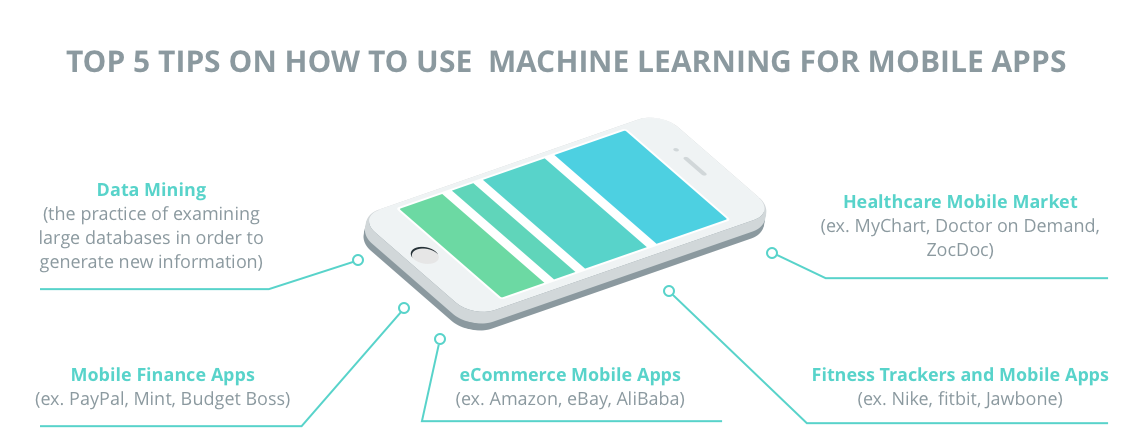Introduction
Mobile apps have become an integral part of our daily lives. From ordering food to managing our finances, there seems to be an app for everything. However, the expectations of users have also grown, and they now demand apps that not only function seamlessly but also adapt to their needs and preferences. This is where machine learning (ML) comes into play.
Machine learning is a subset of artificial intelligence (AI) that allows systems to learn from data and improve their performance over time without being explicitly programmed. When integrated into mobile app development, ML can unlock a world of possibilities, enhancing user experiences and providing valuable insights to businesses.
The Marriage of Mobile Apps and Machine Learning
Personalized User Experiences
Imagine a mobile shopping app that suggests products based on your past purchases and browsing history. Or a fitness app that tailors workout plans to your fitness level and goals. These are all made possible through machine learning algorithms that analyze user data and provide personalized recommendations. ML can help mobile apps understand user behavior, preferences, and habits, leading to higher user engagement and satisfaction.
Enhanced Security
Security is a top concern in mobile app development. Machine learning can be used to detect and prevent security threats. ML algorithms can analyze patterns of user behavior to identify suspicious activities and flag potential security breaches. This proactive approach helps in safeguarding user data and maintaining the app’s integrity.
Natural Language Processing (NLP)
NLP is a branch of ML that focuses on the interaction between humans and computers using natural language. Mobile apps can leverage NLP to enable voice commands, chatbots, and language translation features. This not only improves user convenience but also opens up new avenues for communication and engagement.
Predictive Analytics
ML can enable mobile apps to make predictions and recommendations based on historical data. For instance, weather apps can use ML to provide more accurate weather forecasts, ride-sharing apps can estimate arrival times more precisely, and finance apps can offer investment advice based on market trends. Predictive analytics powered by ML adds value to mobile apps by making them more informative and useful.
Challenges in Integrating Machine Learning into Mobile Apps
While the potential benefits of using machine learning in mobile app development are immense, there are also challenges to overcome:
Data Privacy and Security: Collecting and analyzing user data for ML models can raise concerns about data privacy. Developers must implement robust security measures and comply with regulations like GDPR to protect user information.
Resource Intensiveness: ML models can be resource-intensive, requiring significant computing power and storage. Mobile devices may not always have the processing capability to run complex ML algorithms efficiently.
User Acceptance: Users may be hesitant to grant apps access to their personal data for ML purposes. Developers must be transparent about data usage and obtain user consent.
Maintenance and Updates: ML models require continuous training and refinement to stay effective. Developers need to allocate resources for model maintenance and updates to ensure long-term success.
Real-World Examples
Let’s take a look at some real-world examples of mobile apps that have successfully integrated machine learning:
Netflix: The streaming giant uses ML algorithms to recommend movies and TV shows to its users. These recommendations are based on a user’s viewing history, preferences, and ratings, making the viewing experience highly personalized.
Google Photos: Google Photos uses ML for image recognition and organization. It can automatically tag and categorize your photos, making it easier to find and share memories.
Uber: Uber uses machine learning to predict rider demand in specific areas, helping drivers maximize their earnings by positioning themselves in high-demand zones.
Duolingo: The language-learning app employs ML for personalized lesson recommendations and to adapt the difficulty level of exercises based on a user’s progress.
Conclusion
Machine learning has revolutionized the way we interact with mobile apps. It enables apps to learn from user behavior, provide personalized experiences, enhance security, and offer predictive insights. As the field of ML continues to evolve, we can expect even more innovative and intelligent mobile apps in the future.
For mobile app developers, embracing machine learning is not just a trend but a necessity to stay competitive and meet user expectations. However, it’s crucial to address the challenges associated with data privacy, resource requirements, user consent, and ongoing maintenance.
The fusion of mobile app development and machine learning holds enormous potential, and as technology advances, we can anticipate a new era of smarter, more intuitive, and user-centric mobile apps that make our lives easier and more enjoyable.


